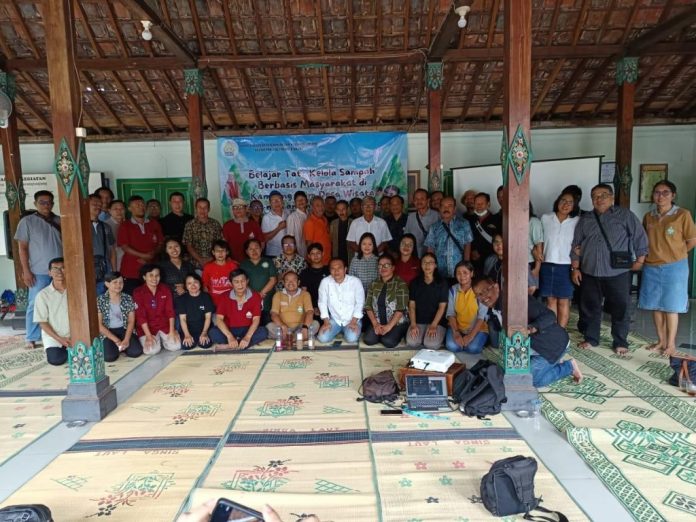A Church in Indonesia is helping a small hamlet once vulnerable to climate impacts become a national model for community-led waste management, rooted in Catholic social teaching and Pope Francis’ encyclical Laudato Si’.
Karangtanjung Hamlet in Pandowoharjo Village, Sleman, has become a showcase for climate adaptation and environmental action, following its recognition in 2020 as a “National Main Climate Village,” according to the Archdiocese of Semarang.
The transformation has been supported by the Commission for Justice, Peace, and Integrity of Creation (KKPKC) of the Western Vicariate of Yogyakarta, which organized a community-based waste management program in the area.
“We are invited to build collective awareness to manage waste, which often becomes a problem, into a blessing,” said Father Benedicktus Hanjar Krisnawan, Pr., parish priest of St. John Paul II Brayut Parish.
“With good governance starting from the smallest unit, namely the family, [it] will bring economic value and also be an effort to preserve the Earth as our common home, as stated by Pope Francis in the Laudato Si’ encyclical,” the priest added.
Father Benedicktus also reminded participants that “the Earth we inhabit today is an inheritance for future generations and must be preserved together.”
The initiative brought together parish representatives and KKPKC leaders from Yogyakarta’s Western and Eastern vicariates to learn from Karangtanjung’s waste governance experience.
Participants visited the hamlet to observe firsthand how local efforts are shaping sustainable practices and inspiring faith-based climate action.
“I am joyful and grateful because I can learn and interact directly with the people of Karangtanjung Hamlet, Pandowoharjo Sleman, in waste management,” said Father Adolfus Suratmo Atmomartoyo, Pr., chair of KKPKC for the Western Yogyakarta Vicariate.
He explained that the program builds on a 2022 waste management learning experience with Resik Plus and serves as a response to pressing local issues. “This activity also stems from our concern about the closure of the Piyungan landfill and the fact that many in the community are still not fully aware of how to manage and sort waste.”
Local officials and residents also expressed pride in the hamlet’s recognition and continued environmental leadership.
“This visit is an honor as a form of recognition and appreciation of the hard work of the Karangtanjung hamlet community in managing waste and protecting the environment,” said Sunarto, head of Karangtanjung Hamlet. “Communication will continue with environmental activists so that the spirit of Karangtanjung residents in protecting the environment is maintained.”
Community waste management in the hamlet began taking shape in 2016 when Karangtanjung was selected to represent Sleman in the Climate Village competition. Waste was gradually managed at the hamlet level, starting from each neighborhood unit (RT).
“Residents agreed to manage waste collectively, starting from each RT. Each RT was provided with two waste bins (organic and non-organic), and there was sorting at the household level. The collectors initially came twice a week, then three times, and brought the waste to the hamlet’s TPS,” explained Eko Siswanto, a community leader. “The key is instilling awareness about healthy living by managing waste correctly.”
He added that every local gathering—from neighborhood meetings to youth group events—includes reminders about waste management, and that the community also uses social media to spread the message.
In 2017, the hamlet won first place in the district Climate Village competition and was later selected for the national evaluation. A year later, it launched a Climate Village Tourism Program, now categorized as “Advanced.”
In 2020, Karangtanjung received the “Main Category” designation in the national assessment, with waste management as a core criterion. The hamlet was rewarded by the Ministry of Environment with the construction of a TPS3R facility (Reduce, Reuse, Recycle Waste Management).
The final session of the program included a composting workshop led by P. Kianto Ajmodjo, M.Sc., from the Faculty of Technobiology and the Laudato Si’ Team at Atma Jaya University Yogyakarta. He demonstrated how kitchen waste can be processed using biowash promic to create fertilizer and planting media.
“It is hoped that with this knowledge, household waste will no longer be thrown away in plastic bags, creating piles of hard-to-decompose garbage,” he said.
Karangtanjung’s model reflects a grassroots approach to ecological conversion, inspired by Church teachings and grounded in the lived experience of communities adapting to climate change.









